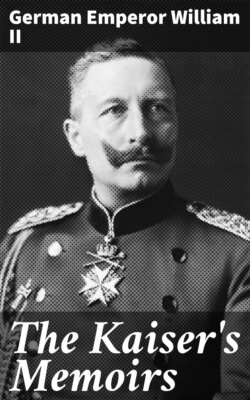Читать книгу The Kaiser's Memoirs - German Emperor William II - Страница 12
На сайте Литреса книга снята с продажи.
RELIEF AT CHANCELLOR'S DISMISSAL
ОглавлениеTable of Contents
In 1890, at the Narva maneuvers, I was obliged to describe minutely to the Tsar the retirement of Prince Bismarck. The Tsar listened very attentively. When I had finished, the usually very cool and reserved sovereign, who seldom spoke about politics, spontaneously seized my hand, thanked me for this token of my confidence, regretted that I had been brought into such a situation and added, in exactly these words: "Je comprends parfaitement ta ligne d'action; le Prince avec toute sa grandeur n'était après tout rien d'autre que ton employé ou fonctionnaire. Le moment où il réfusait d'agir selon tes ordres, il fallait le renvoyer. Moi pour ma part je me suis toujours méfié de lui, et je ne lui ai jamais cru un mot de ce qu'il faisait savoir ou me disait lui-même, car j'étais sûr et savais qu'il me blaguait tout le temps. Pour les rapports entre nous deux, mon cher Guillaume [this was the first time that the Tsar so addressed me], la chute du Prince aura les meilleures conséquences, la méfiance disparaîtra. J'ai confiance en toi. Tu peux te fier à moi."[2]
I immediately wrote down this important talk at the time it occurred. I am objective enough to ask myself to what extent the courtesy of one ruler to another and possibly, in addition, the satisfaction at the elimination of a statesman of Bismarck's importance, can have influenced the Tsar, consciously or unconsciously, in making the above-mentioned statement. Prince Bismarck's belief in the Tsar's trust in him was, subjectively, undoubtedly genuine; and, moreover, there can be no doubt as to the esteem in which Alexander III held Bismarck's ability as a statesman.
In any event, the Tsar remained true to his word up to the day of his death. This, to be sure, did little to change Russia's general policy, but Germany, at least, was safe from an attack from that quarter. The straightforward character of Alexander III guaranteed this—it became otherwise under his weak son.
Whatever one's attitude may be toward Bismarck's Russian policy, one thing must be acknowledged: the Prince, despite the Congress of Berlin and the rapprochement of France to Russia, was able to avoid serious friction. That is equivalent to saying that, reckoning from the time of the Berlin Congress, he played a superior diplomatic and statesmanlike game for twelve years (1878–90).
